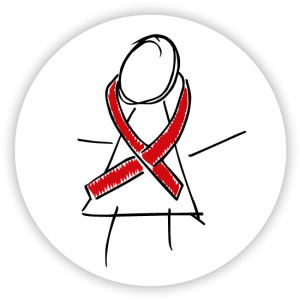3TC or FTC monotherapy suboptimal as a bridging strategy for adolescents
1 August 2014. Related: Conference reports, Paediatric care, Paediatric Workshop 6 Melbourne 2014.
 Polly Clayden, HIV i-Base
Polly Clayden, HIV i-Base
Monotherapy with lamivudine or emtricitabine (3TC or FTC) is suboptimal as a bridging strategy for adolescents compared to failing antiretroviral treatment (ART) regimen according to data presented at the 6th International Workshop on HIV Paediatrics.
Allison Agwu presented results on behalf of researchers from IMPAACT P1094 – a randomised controlled trial that compared the use of 3TC or FTC monotherapy as a short-term bridging regimen vs continuation of non-suppressive ART in non-adherent participants.
Dr Agwu explained that 30-40% of vertically infected adolescents have virological failure with persistent viraemia > 400 copies/mL while on ART. There is no consensus on how best to manage this population.
In the presence of the M184V mutation, 3TC or FTC monotherapy does not suppress viral replication or select for additional drug resistance mutations but reduces viral fitness. The researchers hypothesised that 3TC or FTC monotherapy might prevent immunologic deterioration compared with continuing failing ART.
The primary objective of P1094 was to compare immunologic deterioration over 28 weeks in adolescents receiving the two strategies, with virological failure and documented M184V resistance. These adolescents were considered likely to be non-adherent on an optimised ART regimen due to problems with adherence, tolerability or toxicity (and attempts to improve adherence had been unsuccessful). The primary endpoint was > 30% decline in absolute CD4 count.
The study enrolled 33 participants from the US, Brazil, Thailand and Argentina between May 2011 and December 2012; 16 were randomised to continue failing ART and 17 to receive 3TC or FTC monotherapy. The original target for the study was 344 participants but it closed early – in February 2013 – due to slow accrual at US sites and long regulatory processing times that delayed opening in the other countries.
Participants were a median age of 15 years (range 10-24), 33% were male, their median CD4 count was 472 cells/mm3 (156-1078; 70% > 400) and viral load was 4.0 log10/copies/ml (2.2-5.6).
Prior to the study, facilities had attempted the following interventions (participants had a median of 4): counselling (94%), frequent clinic visits (75%), reminders (56%), therapy (56%), ADL triggers (44%), peer support (31%), rewards (31%), regimen modification/simplification (25%), home visits (19%), DOT (6%) and G-tube (6%).
Mechanisms used to determine non-adherence were (participants had a median of 3): participant reported (79%), persistent viraemia (70%), agreement of two health workers (61%), pharmacy refill history (36%), pill count (21%) and other (9%).
Dr Agwu reported that 5 participants in the monotherapy arm reached the primary endpoint for CD4 decline, p=0.03 (log-rank) The Kaplan-Meier estimate of probability of failure at 28 weeks was 0.41 (standard error 0.14). There were no class C CDC events or deaths. There was one grade 4 hyperbilirubinaemia in the continuing ART arm.
She noted that to the investigators knowledge this is the only randomised controlled trial of 3TC or FTC monotherapy in this population and although the sample size was small the findings were highly significant.
Comment
Retrospective data from a case note review of children with limited options that received 3TC montherapy as a holding strategy for children in South Africa with limited options was reported last year. [2] The children in the South African Study were younger, 8.02 years (IQR 4.07-11.80) and received monotherapy for a median of 6 months during which time their CD4 count decreased by 23% but did not reach pre-ART levels.
Both studies suggest that this strategy is not ideal and once again highlight the adherence challenges – particularly for adolescents.
References:
- Agwu AL et al. 3TC/FTC monotherapy vs continuing failing cART as a bridging ART strategy in persistently non-adherent HIV- infected youth with M184V resistance: results of IMPAACT P1094. 6th International Workshop on HIV Paediatrics, 18-19 July 2014, Melbourne. Oral abstract O_011.
- Lazarus EM et al. Lamivudine monotherapy as a holding strategy in HIV-infected children in South Africa. J AIDS Clin Res 4: 246, 2014.
http://omicsonline.org/lamivudine-monotherapy-as-a-holding-strategy-in-hivinfected-children-in-south-africa-2155-6113.1000246.php?aid=20129#

